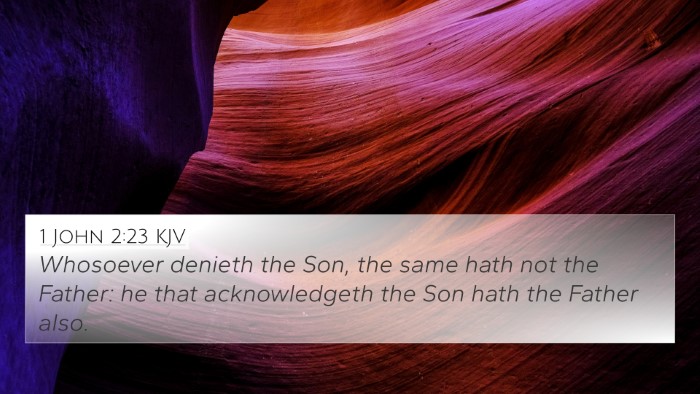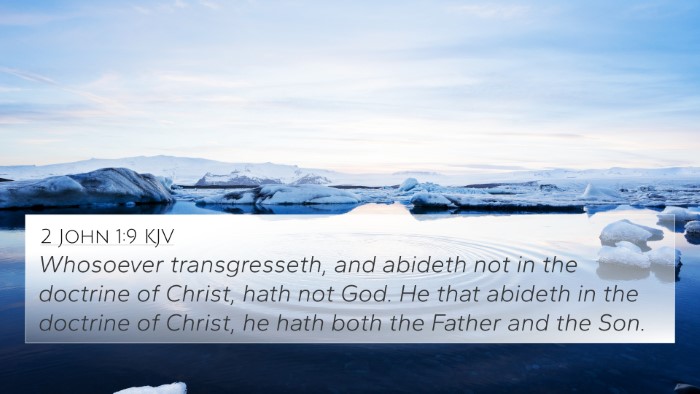Old Testament
Genesis Exodus Leviticus Numbers Deuteronomy Joshua Judges Ruth 1 Samuel 2 Samuel 1 Kings 2 Kings 1 Chronicles 2 Chronicles Ezra Nehemiah Esther Job Psalms Proverbs Ecclesiastes Song of Solomon Isaiah Jeremiah Lamentations Ezekiel Daniel Hosea Joel Amos Obadiah Jonah Micah Nahum Habakkuk Zephaniah Haggai Zechariah MalachiJohn 15:23 Similar Verses
John 15:23 Cross References
He that hateth me hateth my Father also.
Uncover the Rich Themes and Topics of This Bible Verse
Listed below are the Bible themes associated with John 15:23. We invite you to explore each theme to gain deeper insights into the Scriptures.
John 15:23 Cross Reference Verses
This section features a detailed cross-reference designed to enrich your understanding of the Scriptures. Below, you will find carefully selected verses that echo the themes and teachings related to John 15:23 KJV. Click on any image to explore detailed analyses of related Bible verses and uncover deeper theological insights.

John 8:40 (KJV) »
But now ye seek to kill me, a man that hath told you the truth, which I have heard of God: this did not Abraham.

1 John 2:23 (KJV) »
Whosoever denieth the Son, the same hath not the Father: he that acknowledgeth the Son hath the Father also.

2 John 1:9 (KJV) »
Whosoever transgresseth, and abideth not in the doctrine of Christ, hath not God. He that abideth in the doctrine of Christ, he hath both the Father and the Son.
John 15:23 Verse Analysis and Similar Verses
Meaning and Interpretation of John 15:23
John 15:23 states, "He who hates Me hates My Father also." This verse encapsulates a deep theological truth about the relationship between Jesus and the Father, highlighting the inseparability of their identities and missions. Below, we explore key insights drawn from various public domain commentaries.
Contextual Background
In the Gospel of John, Jesus is depicted as the Divine Word made flesh, and His relationship with the Father is central to the narrative. This specific verse falls within a larger discourse where Jesus speaks of love, hatred, and the world's response to Him and His mission. Understanding this context is vital for interpreting this verse.
Insights from Commentaries
-
Matthew Henry's Commentary
Henry emphasizes that this verse illustrates the profound connection between Christ and the Father. The hatred directed towards Jesus is ultimately a rejection of God. He comments that true love for the Father is inseparable from love for the Son, and vice versa.
-
Albert Barnes' Notes
Barnes focuses on the implications of hatred towards Jesus. He points out that those who oppose Christ also reject the Father’s revelation of Himself. This hatred is indicative of a broader spiritual condition that separates individuals from divine truth.
-
Adam Clarke's Commentary
Clarke delves into the gravity of the statement, indicating that the connection between Christ and the Father dictates the seriousness of animosity against them. He suggests that such hatred stems from disbelief and the spiritual blindness of the oppressors.
Thematic Connections
This verse serves as a foundation for several important theological themes within the New Testament:
-
Love and Hatred:
The juxtaposition of love for God and hatred for Christ emphasizes the believer's role in reflecting God's love.
-
Divine Revelation:
It affirms the belief that Jesus is the complete revelation of the Father, making their relationship essential to understanding God.
-
Spiritual Warfare:
This verse highlights the hostility faced by Jesus and His followers, underscoring the ongoing spiritual battle against truth.
Bible Verse Cross-References
John 15:23 connects powerfully with many other Biblical texts that reinforce its themes:
- John 5:23: "That all should honor the Son just as they honor the Father." This verse solidifies the equality and unity of purpose between the Father and the Son.
- 1 John 2:23: "No one who denies the Son has the Father; whoever acknowledges the Son has the Father also." This underlines the equivalence in the rejection of either God or Jesus.
- Matthew 10:40: "He who receives you receives Me, and he who receives Me receives Him who sent Me." This shows the unity of the mission of Christ and the Father.
- Luke 10:16: "He who hears you hears Me, and he who rejects you rejects Me, and he who rejects Me rejects Him who sent Me." This highlights the connection between accepting Jesus and accepting God.
- John 12:44-45: "And Jesus cried out and said, ‘He who believes in Me, believes not in Me but in Him who sent Me. And he who sees Me sees Him who sent Me.’" This emphasizes the visible manifestation of God in Jesus.
- John 8:42: "If God were your Father, you would love Me, for I proceeded forth and came from God; nor have I come of Myself, but He sent Me." This reinforces the idea that love for God is displayed in love for Christ.
- Romans 8:7: "Because the carnal mind is enmity against God; for it is not subject to the law of God, nor indeed can be." This introduces the concept of enmity towards God manifesting through hatred towards His Son.
Connections Between Bible Verses
In exploring John 15:23, one can see its placement within a broader biblical narrative that emphasizes God's desire for relationship and reconciliation:
- The Prophets and the Messiah: Many Old Testament prophets foretold the coming of the Messiah, setting a precedent for the rejection Christ faced, as captured in John 15:23.
- The Apostolic Writings: Early church writings frequently reflect this theme of hatred towards Christ and belief as a community endeavor, highlighting inter-Biblical dialogue.
- The Themes of Revelation: The consistent theme of God revealing Himself culminates in the New Testament with Jesus as the fulcrum of this relationship.
Studying Bible Verse Parallels
When engaging in a comparative Bible verse analysis, one may utilize tools for Bible cross-referencing to deepen understanding:
- Bible Concordance: A tool that helps identify themes and cross-references between verses.
- Bible Cross-reference Guide: These guides often highlight connections that may not be immediately evident.
- Cross-reference Bible Study: Using verse parallels enhances understanding with contextual studies of love and hatred towards God.
- Comprehensive Bible study methods: Integrating thematic Bible verse connections can enrich interpretation and application.
Conclusion
In sum, John 15:23 stands as a powerful testament to the relationship between Christ and the Father. As believers reflect on this verse, it is essential to understand the seriousness of love and rejection of God, and to utilize tools for Bible cross-referencing to explore the rich tapestry of connections throughout Scripture.


